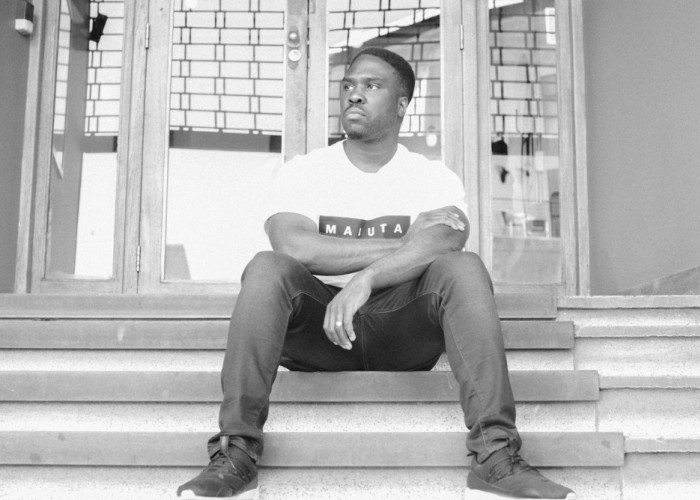Jan 13, 2026 2:09 PM
More Trump-Kennedy Center Cancellations
The fallout from the renaming of the John F. Kennedy Center for the Performing Arts to include President Donald…

Derek Hodge recently was in Johannesburg, South Africa, as part of a residency program that found him working on a new recording by trumpeter Ndabo Zulu’s Umgidi Ensemble.
(Photo: Tseliso Monaheng)Derrick Hodge is a cool, calm, collected cat.
He is intentional, deliberate in every sense—from the words he chooses when speaking, to the demeanor he adopts while interacting with people. And these qualities serve him beyond the bass notes that have made him a respected and influential, jazz-leaning musician.
Recently, Hodge visited Johannesburg, South Africa, as part of the inaugural residency program initiated by his Colour of Noise nonprofit and a South Africa-based group, Nu2morrow Music, helmed by longtime music-industry insider Hardy McQueen.
“When we started, the intention was [to create] real connection, and real collaboration that delivers a product. For me, it was to say to Derrick, ‘Let’s create an intentional opportunity to meet with people, but also to create real collaboration,’” McQueen said about the project.
Since stepping out, playing the music of, and absorbing wisdom from, acclaimed luminaries like Terence Blanchard, Hodge’s journey has explored love and freedom in all their intricate, complex combinations. He’s managed to carve out a space in modern jazz that allows him to realize his personhood, fully.
“Terence never tried to change me, ever. When I first got out with him, all he ever did was try [and] encourage me to improve all those elements in my writing that spoke [with] my voice,” Hodge said. “My first film writing opportunities were through him. He practiced what he preached; he wasn’t just like, ‘Young man, you’re gonna be all right one day.’”
As Common’s musical director, the bassist and composer is responsible for how the esteemed MC’s live performances pan out. As a collaborator, he’s been instrumental in the boundary-expanding sound of the Robert Glasper Experiment, and as a solo artist, he’s offered up two albums—Live Today (2013) and The Second (2016)—to heal our collective consciousness.
Internationally, when South African jazz is mentioned, people still think of the timeless work of Hugh Masekela and Miriam Makeba. This new collaboration is meant to “create the chances for an international audience to see that there is an amazing product, and the legacy of those greats,” according to McQueen.
For this first edition, Hodge was in town Sept. 4–11 to do production work on an untitled debut project by trumpeter Ndabo Zulu’s Umgidi Ensemble.
“The best part of this exchange has been [the musicians] seeing that [American jazz musicians] want to connect to what it is that they have to say, and offer our input. But first, we come in peace. We come by listening,” Hodge said.
He brought along friend and collaborator Keith “Qmillion” Lewis. As recording and mixing engineer, Lewis was responsible for the sound behind several Robert Glasper Experiment albums, Hodge’s The Second and R+R=Now’s Collagically Speaking.
“You walk in and you just have giants everywhere, but giants with no ego,” Lewis said about working on Collagically Speaking. “They trust each other, and they have the same trust in me. [Glasper], the way he likes to work, you come in, you hang out, eat some food, they have some drinks—I can’t drink. When everybody starts feeling nice, then they gonna play. And it’s gonna be one take, and that’s it. Nobody is laboring over parts; nobody’s trying to say, ‘Oh, I need to play this perfectly.’ When you’re at that level, when you’re living your life and are in the zone, when you sit down, you play. And it’s just that moment.”
Hodge said that the recognition that has come from working on highly visible projects has opened up other musicians to the power of their own voices. “This is really the era of acceptance,” he said. “I really sense that happening, and I’m just excited about it. ... I’m trying to tap into different sides of myself. I’m about to dive into working on my next album very shortly. But that’s also coincided with a few production obligations, since I’ve been co-producing albums for the Blue Note label.”
To that end, he’s contributed to albums by James Francies and Kendrick Scott, as well as Quincy Jones.
“I also have an idea to do a solo album where it’s just bass, and maybe [drummer Chris Dave] on a song or two,” he said about the future. “What’s going on for me, career-wise, are purpose-driven things.” DB

Belá Fleck during an interview with Fredrika Whitfield on CNN.
Jan 13, 2026 2:09 PM
The fallout from the renaming of the John F. Kennedy Center for the Performing Arts to include President Donald…

Peplowski first came to prominence in legacy swing bands, including the final iteration of the Benny Goodman Orchestra, before beginning a solo career in the late 1980s.
Feb 3, 2026 12:10 AM
Ken Peplowski, a clarinetist and tenor saxophonist who straddled the worlds of traditional and modern jazz, died Feb. 2…

The success of Oregon’s first album, 1971’s Music Of Another Present Era, allowed Towner to establish a solo career.
Jan 19, 2026 5:02 PM
Ralph Towner, a guitarist and composer who blended multiple genres, including jazz — and throughout them all remained…

Rico’s Anti-Microbial Instrument Swab
Jan 19, 2026 2:48 PM
With this year’s NAMM Show right around the corner, we can look forward to plenty of new and innovative instruments…

Richie Beirach was particularly renowned for his approach to chromatic harmony, which he used to improvise reharmonizations of originals and standards.
Jan 27, 2026 11:19 AM
Richie Beirach, a pianist and composer who channeled a knowledge of modern classical music into his jazz practice,…